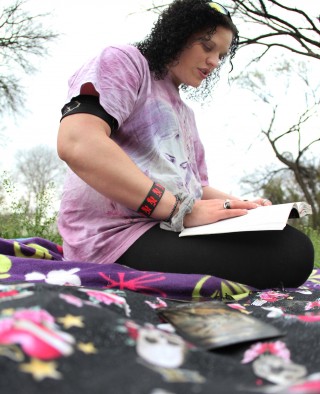

Matt Hellman | Lariat Photo Editor
By Joshua Gill
Contributor
From her Harley Davidson T-shirt, dark lipstick and eyeshadow against her pale complexion, red streaks in her black hair and pentagram hung around her neck, one might think Xaos Giovanni to be a Goth at first glance — but the truth is more complex.
Giovanni, mother of three and employee at Teriyaki Park and The Texas Chainsaw Nightmare Haunted House, said she finds that being the matriarch of a coven of witches is rewarding, despite the persecution she and her family endure.
Giovanni said she had her first experience with witchcraft at an early age.
“I was born this way,” she said. “I was always like this. I started when I was 3 or 4. I could see ghosts.”
Daughter of a Mormon mother and an atheist father, Giovanni’s parents encouraged her to choose her own religion, she said. But her mother was uncomfortable with her interest in witchcraft, so she initially settled on Catholicism, which was the most welcoming and accepting of the Christian denominations she encountered, Giovanni said.
Giovanni said she later converted from Catholicism because of her interest in “the craft” and disillusionment with Christianity.
“I follow Pan and Diana, Celtic and Greek,” Giovanni said, explaining that she worships the Celtic god of nature, Pan, and the Roman goddess of the moon, birth and hunting, Diana, who is equated with the Greek goddess Artemis.
“That’s who I follow. I follow the Earth beliefs,” Giovanni said. “When I pray to them, I always get an answer.”
Paganism, the wider religion under which witchcraft (also called “the Earth beliefs”) is categorized, is a growing religion in the United States, according to the U.S. Census Bureau.
The last estimate of adherents to Paganism, which was done in 2008, found that there were 340,000 practitioners in the United States — a 142.8 percent increase from 140,000 practitioners in 2001.
Giovanni said she is of the fifth generation of witches born in the United States who practice a brand of witchcraft that was brought to the United States from Sicily.
Despite the growth of Paganism, Giovanni said she and her family feel persecuted for their beliefs “almost daily.”
“But I won’t hide. I won’t run. I refuse,” she said. “They don’t have to like us, but eventually they will have to accept us.”
In one instance of harassment, Giovanni said she visited a Barnes and Noble bookstore dressed for a heavy metal concert in which she was about to perform. She wore black Gothic apparel with a pentagram around her neck, a symbol of witchcraft.
While Giovanni was at the bookstore, three men rushed her, yelled at her and slammed a Bible on the ground in front of her, she said.
Giovanni said she was appalled at the men’s disrespect for her, but more so at what she considers their disrespectful use of a book which she respects as a holy text.
Dr. Blake Burleson, a world religions professor in Baylor’s religion department, said it is common for people to be attracted to witchcraft for reasons similar to Giovanni’s.
“I find that many of those I encounter typically come from a Christian background but are disenfranchised with the institution of the Church,” Burleson said. “What seems to attract them is the mother-centeredness of it. The earth-centeredness. The ecology.”
Despite the misconceptions about witches as devil worshippers, Giovanni said she and her coven do not believe in the existence of Satan, nor do they practice black magic.
“I’m what they call a homeopathic healer,” Giovanni said. “I use plants to heal the body and the spirit, and I love what I do.”
Giovanni said members of her coven believe spiritual energy is present throughout the world and that one can interact with and manipulate it.
Whatever energy she and her followers send out, is revisited on them three to one hundredfold, as in the concept of karma, she said. Giovanni said this concept includes not only the energy they send out to other people, but to all living things.
“We believe that if you live a life of good,” Giovanni said, “you go to a beautiful place called the Summer Place. If you do wrong, you’re stuck until you fix it, and then you move on.”
While Giovanni said witchcraft is often met with suspicion and persecution by those who believe differently, she said there is no reason to fear practitioners of her religion.
“We’re like everyone else,” Giovanni said. “Our beliefs are just different. It’s just chemistry, botany, alchemy and astrology. Nothing else.”
Burleson said according to his experience, the view of adherents of witchcraft as typical people who simply hold unique beliefs is accurate.
“The ones that I know are just ordinary people,” he said. “Typically the ones that I have encountered among the Anglo class are middle to upper class, some of them wealthy.”
Giovanni said she welcomes the opportunity to speak openly about her beliefs and clear up any misconceptions people might have.
“They’re more than welcome to come and talk to me,” she said. “I only turn away ignorance.”





